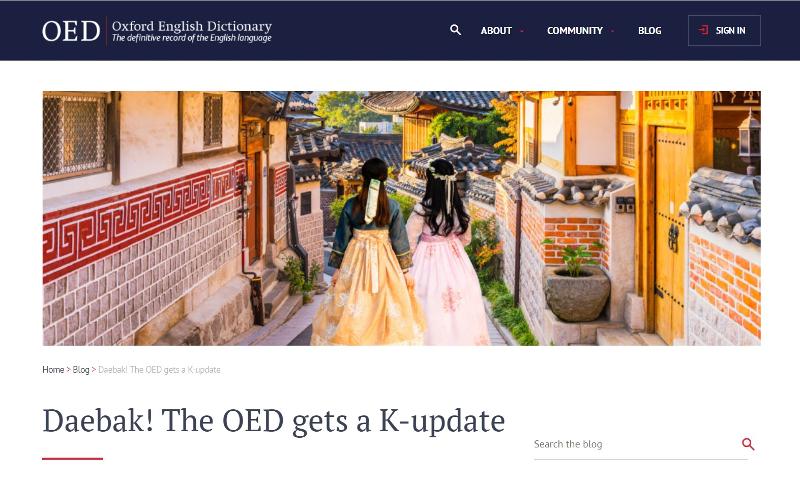
Oxford English Dictionary has added 26 Korean to its latest edition. (Screen capture from dictionary's official website)
By Yoon Hee Young
Oxford English Dictionary has added 26 Korean words including daebak and meokbang (mukbang).
The additions are thanks to the surging exposure of Korean language to English speakers through the spread of Hallyu (Korean wave) such as the Oscar-winning film "Parasite," Netflix hit series "Squid Game" and K-pop sensation BTS.
The British daily Guardian on Oct. 5 said Oxford University Press, the publisher of the dictionary, added 26 Korean words to its latest edition last month.
Defining "K-" as "a prefix forming nouns relating to Korea and its (popular) culture," the dictionary cited "K-drama" as an example.
"These days, everything seems to be getting prefixed with a K- as Korea's popular culture continues to rise in international popularity," it added. "Korean style is now seen as the epitome of cool."
The dictionary described banchan as "a small side dish of vegetables, etc., served along with rice as part of a typical Korean meal," and gimbap (spelled "kimbap" in the dictionary) as "a Korean dish consisting of cooked rice and other ingredients wrapped in a sheet of seaweed and cut into bite-sized slices." Other Korean dishes added included bulgogi (marinated grilled beef), dongchimi (water radish), galbi (grilled ribs), japchae (stir-fried glass noodles and vegetables) and samgyeopsal (grilled pork belly).
Hallyu is described as "the increase in international interest in Korea and its popular culture, esp. as represented by the global success of Korean music, film, television, fashion, and food." Meokbang (spelled "mukbang" in the dictionary) is called a "video, esp. one that is livestreamed, that features a person eating a large quantity of food and talking to the audience." And daebak is a noun form of "something lucrative or desirable, esp. when acquired or found by chance" or an interjection "expressing enthusiastic approval."
Words like oppa and eonni (spelled "unni" in the dictionary) have undergone noteworthy semantic changes when used outside of Korea, the dictionary explained. A word used by a female speaker to address or refer to her older brother in Korea, oppa in Southeast Asia is also used to refer to an attractive Korean man, especially a famous actor or singer. Eonni, which is used by also a female speaker to refer to her older sister, is often used by all genders to refer to a female Korean actor or singer.
The Korean expressions of English words such as "skinship" and "fighting" are also on the list.
"The adoption and development of these Korean words in English also demonstrate how lexical innovation is no longer confined to the traditional centers of English," the dictionary said. "(These words) allow the Korean wave to continue to ripple on the sea of English words."
Around 100 Korean words including the 26 just added are in the dictionary.
hyyoon@korea.kr